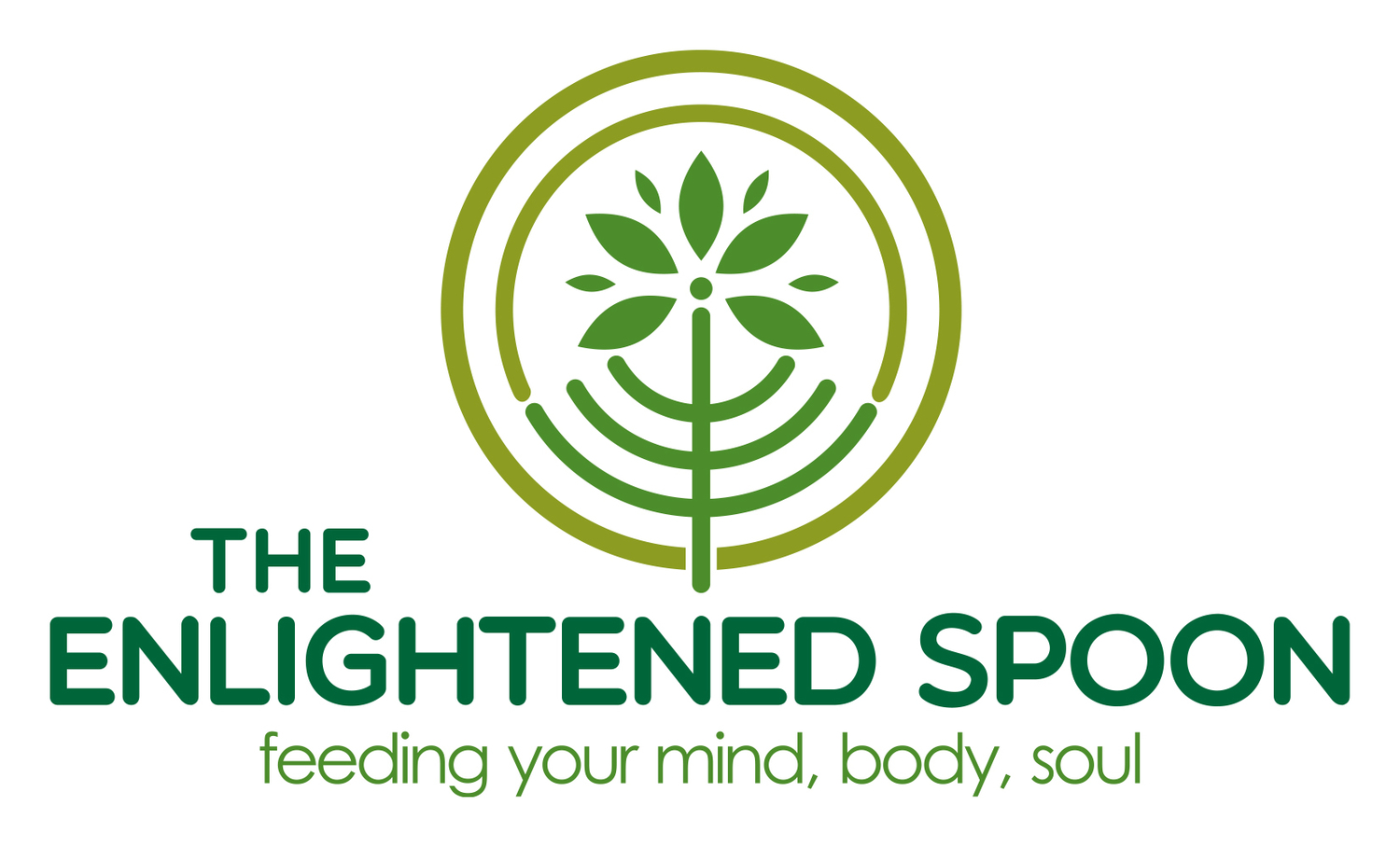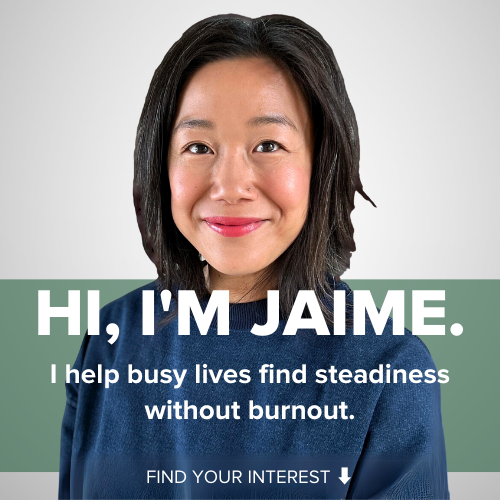Best Stress-Relieving Foods: What, When and How to Eat When You’re Stressed ?
/In this week's video, I share with you not only WHAT to eat to more effectively manage stress, but also WHEN and HOW to eat - the often forgotten part of eating.
All of these factors will affect how you function and perform throughout your day. What, when and how you eat is going to really affect your stress levels, so let's break it down.
Don’t have 13 minutes to watch this? Read the transcript below!
TRANSCRIPT:
You are what you eat, right?
Umm… not quite. You are not only what you eat, but you are what you absorb.
You are also WHEN you eat (anybody get hangry?)
And You are HOW you eat.
All of these factors will affect how you function and perform throughout your day. Especially if you’re mega busy, running around from meeting to meeting or Zoom-to-Zoom as we might be these days with virtual meetings in 2020… what, when and HOW you eat is going to really affect your stress levels.
Hi! I’m Jaime Tan at Enlightened Spoon - wellness coach, yoga + meditation teacher and nutritional therapist helping overworked high achievers manage stress through nutrition, movement and lifestyle rituals.
I am ALSO an Executive Producer at one of the world’s top advertising agencies, frequently shooting commercials with loads of celebrity talent and pro-athletes.
So when it comes to managing a busy, full-on life and reducing the overwhelm that can happen when you’ve got a lot going on - I’ve learned a few things I’d love to share with you today.
In today’s video, I’ll share with you not only what to eat to more effectively manage stress, but also when and how to eat - the often forgotten part of eating.
Let’s start with the when and how to eat first, and then we’ll dive into the what to eat - so stick around!
Don’t forget to also check out my previous video on 13 practical tips on how to manage stress at work and at home, and in the next video I’ll also be sharing with you why you might be putting on weight, especially around the belly - even if you’re “doing all the right things” like eating the right foods and working out. It’s got something to do with your stress levels.
So if you’re looking forward to this, give this video a like, hit subscribe to follow this channel and the notification bell so you’re informed when my next video comes out.
The Science of Stress
Before we get down to it, we first need a small crash-course in the science of stress.
We need to understand the role of cortisol.
Cortisol is your body’s main stress hormone that controls mood, motivation and fear. Think of it as your body’s built-in alarm. Your adrenal glands sit on top of your kidneys, and they produce cortisol.
Your sleeping and waking cycles are also controlled by cortisol. It’s supposed to be at its highest in the morning to get you out of bed, and the lowest at night, to help you go to sleep. It’s really sensitive to your eating patterns, stress levels and physical activity throughout the day.
So what you eat, and when you eat are so important to help regulate this cycle.
When You Eat
Let’s start with when you eat.
1. Have a High-Quality Breakfast
Cortisol manages your energy levels by keeping your blood-sugar levels in order. If blood-sugar levels drop too low (if you’re not eating frequently enough), your adrenal glands pump out more cortisol, which then produces glucose to bring your blood-sugar levels back to what they should be.
In the morning, you’re coming off a fast (breakfast = break fast). It’s been about 7-8 hours, usually a little longer, since your last meal, dinner. You need to eat something so your blood-sugar levels don’t drop too low and your adrenals don’t over-pump out cortisol to try and maintain that balance. Eating breakfast also helps bring your cortisol levels down from the morning peak.
The results of a 2015 study published in Physiology & Behavior found that skipping breakfast leads to increased concentrations of free cortisol in the body, which suggests that skipping breakfast is a stressful event.
Increased cortisol in the body can lead to a slew of negative effects, including weight gain, a suppressed immune system, increased disease risk, and blood-sugar imbalances.
But! The quality of what you eat at breakfast is even more important as this sets your blood-sugar levels up for the rest of the day.
We’ll get back to WHAT you should be eating at breakfast a little later, so stick around. (HINT: It’s not cereal).
2. Have Regular meals
Since cortisol manages blood-sugar levels, you don’t want to be skipping meals, or your energy levels are going to keep fluctuating throughout the day, along with an elevated level of cortisol running through your body - keeping you in a highly stressed state.
So have regular meals - breakfast, lunch, dinner - ideally with 3 - 4 hour intervals in between.
If you want to lose weight while highly stressed, this interval between meals can be adjusted a little bit with time-restricted eating, and I’ll get to this in my next video about how and why your high stress levels are causing you to gain weight.
Interested? Hit the subscribe button and the notification bell, so you’re updated when it drops next week.
And hey - if you’re getting value out of this video, do hit the like button and let me know in the comments below!
How you eat
Now let’s talk about HOW you’re eating.
Are you multitasking while you’re eating? As in eating while you’re watching TV, watching this video, typing on your laptop, in the car on the way to somewhere?
Stay in “rest + digest” mode
What you need to understand about eating is: it’s the first step of the digestion process. And how good digestion works is you need to be in “rest + digest” mode - when your parasympathetic nervous system is in control. As opposed to when your sympathetic nervous system - your stressed out “flight or fight” mode - is in control.
When you’re watching something, on your way to somewhere… basically when your mind is focussed on anything else but eating… you’re not in a relaxed state. When you’re not in a relaxed state, no matter what you eat, you’re still not going to be optimally digesting and absorbing it.
When your body is in high stress - high alert mode, cortisol can alter or shutdown not only your digestive, but also reproductive and immune systems… so no matter how healthy the food is that you’re eating, if you’re multitasking while you’re eating, or not relaxed as you’re eating… you’re not gonna be digesting and absorbing it properly. Which can lead to a whole host of other issues.
Mindful eating
So be relaxed while you’re eating. And focus on mindfully eating, while you’re eating.
What to Eat?
Now finally, let’s get down to WHAT to be eating to help you overcome stress.
1. Include protein at every meal
Since we’ve been banging on about maintaining blood-sugar levels at an even rate, to prevent energy spikes and crashes, you want to include protein at every meal. Proteins have a low glycaemic index, meaning they won’t raise your blood-sugar levels, plus they also keep you fuller for longer.
And a little bit of protein goes a long way. On average, your daily protein needs are 1 gram of protein per kilogram of body weight you are. For example, if I’m 60 kg, my total protein intake for the day should be about 60gm.
So 60 grams for me is an average of per-day - a total of:
10 eggs
or 2 hamburger patties (not that I eat meat)
or 2 scoops of whey protein
or half a cup of hemp protein powder
Per day. In total.
That’s not much to spread out across all 3 meals of the day.
If you’ve got a plate of food, think of having only ¼ of the plate to be your protein at every meal.
Breakfast is usually the place where most people, including my wellness coaching clients when they first start out, go wrong.
Cereals, pastries, toast and jam - they’re all simple carbohydrates that will spike your blood-sugar levels first thing in the morning. And as we determined earlier, does not set your cortisol and blood-sugar regulation up right at the start of the day.
Some better protein sources for breakfast (and throughout your day) include:
Eggs
Nuts and seeds
Fish/ organic meats
2. Include green, leafy vegetables at every meal
In addition to good sources of protein, you also want to ensure a good mix of vegetables in every colour across every meal: spinach, kale, chard, broccoli, tomatoes, aubergines, peppers. The more colours of the rainbow, the better.
Veggies contain phytonutrients, or plant nutrients that are highly antioxidant, filled with all the vitamins and minerals you’ll need to help support a stressful life.
Stress is responsible for the generation of free radicals - they’re not great. Very simply - free radicals from stress increase inflammation and ageing in the body. What helps to neutralise free radicals? Antioxidants - such as those found in multi-coloured veggies.
If you’ve got a plate of food, if ¼ is already protein... think of having ½ of the plate to be veggies at every meal. Including breakfast!
3. Include complex carbohydrates, especially at dinner
Complex carbohydrates from starchy whole food sources such as:
All the root vegetables - carrots, turnips, sweet potatoes, beets, yams;
Squashes such as: pumpkins, gourds, squash;
Whole grains such as: brown rice, buckwheat, quinoa.
They are all really important especially at dinner time, at the end of your day.
These all help your gut produce serotonin - which is the precursor to melatonin. Melatonin is the hormone that helps to regulate our sleep-and-wake cycles.
If you’re stressed out and having problems sleeping, how you can help regulate your sleep and stress hormones, is to simply include some complex carbohydrates especially at dinner time.
If you’ve got a plate of food, if ¼ is already protein, ½ is already multi-coloured veggies, think of having ⅛ to ¼ of the remainder of your plate to be your starchy, complex carbohydrates.
For more help getting better sleep, I’ve written a 5-part sleep series - all the evening rituals, foods to and not to eat, natural supplements and meditations to help you get a better night’s sleep.
In a couple videos after this, I’ll dive deeper into sleep and your circadian rhythms and how they’re interconnected with stress. Looking forward to it? Give this video a like, subscribe to this channel, and hit the notification bell to be notified when new videos drop.
4. Increase good fats - especially Omega-3s
Omega-3s are essential fatty acids that our bodies can’t produce on our own - so we need to consume these. These fats are really important as every single cell in our body has a cell membrane made up of fat. Our brains are mostly made up of fat. Our hormones are made up of fat. Regulation of the nervous system and adrenal function, our stress regulation, (amongst many other functions) requires essential fats.
On top of this, omega-3s are also great antioxidants and anti-inflammatories, and if you recall earlier - stress increases inflammation and free radicals - so increasing your omega-3 consumption can really help you to reduce the negative effects of stress.
Some great sources of omega-3 fats include: flax seeds, pumpkin seeds, organic soybean and its products such as tofu and tempeh, walnuts, and dark green sea veggies, such as seaweed and spirulina. Not forgetting small oily fish - salmon, mackerel, anchovies, sardines, herring.
If you’ve got a plate of food, if ¼ is already protein, ½ is already multi-coloured veggies, ⅛ is already starchy complex carbs, think of having ⅛ of the remainder of your plate to be your essential good fats.
5. Hydrate throughout the day
Dehydration leads to higher cortisol levels, adding to your stress.
Don’t forget to keep hydrated throughout the day. Especially if you’re drinking a lot of caffeinated drinks like coffee/ black tea or carbonated sodas… these tend to have an antidiuretic effect, which takes away water from your system.
How much water you’ll need a day varies from person to person depending on how active you are, how hot it is… but drink a big glass of water when you first wake up, a half-hour before each meal, and whenever you feel thirsty. Maybe instead of reaching for a snack, drink a big glass of water.
Need More Help?
If you need more guidance on when, how and WHAT to eat to better manage your crazy, busy life - I’m here to help. Let’s see if you’re the right fit for my 12-week program.
I offer a free session to help you figure out how to personalise the when, how and WHAT to eat, along with the fitness and other lifestyle rituals that can help support your busy, stressful life. Book your session here!








